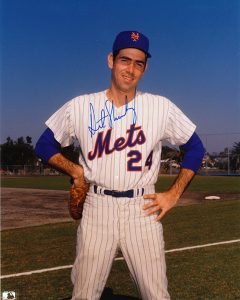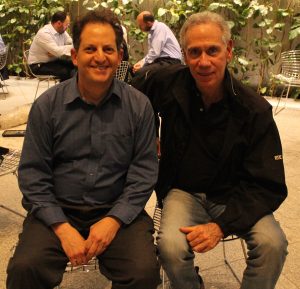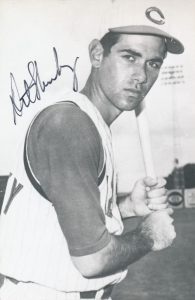Q/A with Art Shamsky: ’69 Mets made him lifelong hero in New York

When it comes to timing, it is hard to beat Art Shamsky. His best season came at the perfect time.
Shamsky will always be remembered – especially in his adopted hometown of New York – as a key player on the “Miracle Mets” team that won the 1969 World Series. A rightfielder and first baseman, Shamsky was part of manager Gil Hodges’s effective platoon system. He batted .300 that year, and turned it up even more with a .538 average in the playoffs against the Atlanta Braves.
That season made him a lifelong hero in New York. So much so, that in the show “Everyone Loves Raymond,” Ray and Robert’s childhood bulldog was named “Shamsky.” Shamsky, the person, not the dog, even made an appearance on the show.
Shamsky also had another big moment. On August 12 and 14, 1966, with the Cincinnati Reds, he clouted homers in four consecutive at bats – something that, as of 2015, has occurred only 35 times in Major League Baseball history.
Since retiring following the 1972 season, Shamsky has worked in several professions – including broadcasting and owning a sports bar. In 2007, he donned a uniform for the first time in decades when he managed the Modiin Miracle, one of six teams in the short-lived Israel Baseball League.
Here is a JBM Q/A with Shamsky.
* * *
Short Takes
“I do remember being in the on-deck circle waiting to hit [in Game 1 of the 1969 World Series], and the whole time I was waiting there – maybe a minute and a half – my whole life flashed in front of me…To get to this one spot that every kid dreams of: playing in the World Series. It’s very, very prominent in my mind. It doesn’t get any better than that.”
Managing in Israel “was an eye-opening experience for me, learning about places I’d heard about as a kid. Being Jewish and managing there, for me, was a neat thing.”
The great Frank Robinson told Shamsky, his Cincinnati Reds teammate in 1965, “Whatever you do, don’t embarrass me.” Shamsky promptly homered and, he recalled, “I thanked God, running around the bases, that I didn’t embarrass Frank.”
“I hit four homeruns in a row, and we lost both games [to Pittsburgh]. We went on the road to Los Angeles, and I’m not in the starting lineup the next day. It was one of the most bizarre times in my career as a baseball player.”
* * *

Art Shamsky (right) and Hillel Kuttler
The JBM Interview
How did the experience of managing a team during the Israel Baseball League in 2007 affect your Jewish identity?
Shamsky: It was my first time over there, so it was an experience to learn more about the State of Israel and also what was going on surrounding Israel. I enjoyed managing. It wasn’t pretty baseball, but it was a chance for me to use my experience as a former big-league player. It was three months of a wonderful experience. I got a chance to visit a lot of the historical places. To be in Jerusalem, Tel Aviv, travel around the country – I’ve got great memories. Also what was important was that I got a chance to meet some wonderful people. We played our games at Kibbutz Gezer, and I told my players, “Who knows who walked in this area a thousand years ago? This is sacred, holy land.”
Am I any more religious because I went there? I don’t think so, but it was an eye-opening experience for me, learning about places I’d heard about as a kid. Being Jewish and managing there, for me, was a neat thing.
You’d spent four years living in another huge Jewish community, when you played for the New York Mets, capped by winning the World Series title in 1969 – and you still live there.
Playing in Cincinnati – it had a small Jewish community, and I don’t think anyone made a big deal about me being Jewish. When I got to New York, that certainly changed. There were so many Jewish people in the New York City area, but that never really affected me one way or the other. I always maintained that I’m a baseball player who happened to be Jewish. After I got out of the game, it seems to have taken on a life of its own. I speak at a lot of temples and synagogues.
I’d imagine that, living as you do in Manhattan, you’re still asked about the ’69 Mets all the time, even so many decades later.
Some people I meet, who weren’t even born at the time, know about that team and the history about it. It’s been passed down from generation to generation. It seems like every day, somebody talks about it to me. … I’m still in New York because of it. The opportunities opened up for me.
That year, my life went full circle. I hurt my back really bad. I was laid up in bed almost the whole six weeks of spring training. I started the season on the disabled list. I ended up having a great year. It was so bleak at the beginning and so great at the end.
Do you retain a specific, sweet memory of that season?
The true legacy of that team is that everybody at some point contributed to the success of that team. It wasn’t just Tom Seaver or Jerry Koosman or Cleon Jones, but it’s about Al Weis and Kenny Boswell, Jerry Grote, Bud Harrelson, Donn Clendenon – you can go down the list.
But the one thing I remember would be that I was really kind of disappointed that I didn’t start Game 1 of the World Series, because I’d come off the playoffs against Atlanta when I had seven hits in 13 at bats. The Orioles started a left-handed pitcher [Mike Cuellar], so I didn’t start the game. But Gil Hodges had enough confidence in me to put me up in the ninth inning to bat against Cuellar as the tying run.
I do remember being in the on-deck circle waiting to hit, and the whole time I was waiting there – maybe a minute and a half – my whole life flashed in front of me. I thought about all those times, growing up in St. Louis, I’d go to the park and just play baseball with all my friends who loved the game as much as I did. I thought about when I signed my professional contract, all those bus rides I took in the minor leagues – in one year, we loaded eight guys in a station wagon – and all the practices. To get to this one spot that every kid dreams of: playing in the World Series. It’s very, very prominent in my mind. It doesn’t get any better than that. That first at-bat, I just had a chance to reflect. Those are really poignant moments in my life.
I grounded out to second base, so I have the distinction of making the last out of the only game we lost in the World Series.
Was your family at the game?
Yeah, my parents were there, and one of my uncles came. I had to scramble to try to get tickets, and what a hassle that was! Tickets were not easy to get. We had to buy them. Everybody was caught up in the World Series. It was such an exciting time for all of us who were part of the team and relatives.
You and Ron Blomberg played in New York at about the same time, both lefty hitters, both Jewish, both managed in the IBL – and you have become friends.
We became really close in Israel. We spent a lot of time together [there]. His team won the championship. They had better players, but it wasn’t because of his managing! I kid him about that: After the [championship] game was over, they asked us to introduce all our players. When it was time for him to, he didn’t even know anybody’s name! Everybody was just Big Guy. I never let him forget that. … One day in Israel, he brings out the lineup on a napkin: Big Guy at first base, Big Guy at second base, Big Guy at third base.
That experience over there was really great. We enjoyed each other’s company. We laughed a lot, and became close. I talked to him yesterday. … Whenever he comes to New York for a Yankee thing, we try to get together. We’ve done [events] together.
What is it that has kept you close?
We’re around the same era, and are opposites in temperament. He’s much more outgoing, and I’m more reserved. We kind of feed off each other.
You and Mike Epstein each hit homeruns in four consecutive at-bats – and you were teammates briefly with the Oakland A’s in 1972. What do you remember about that?
It was not a happy time for me. I got moved around three teams. I had been with two teams for 12 years [in the Reds and Mets organizations]. I got traded over the winter to the Cardinals from the Mets in ’71. The trade to St. Louis, even though I grew up there – I wasn’t really happy about it. I was physically banged up. There was a strike in spring training, and I ended up with the Cubs for a brief time. The Cubs [moved] me to Oakland. I only batted a few times with the Cubs and with the A’s. Even though I was relatively young at the time, 30, I was physically demoralized. I didn’t care about coming back. Subsequently, the DH [designated hitter] came into effect, and a couple of years later I realized I’d made a terrible mistake.
I remember my time in Oakland. It was a great team. Mike was there, and Kenny Holtzman was on the team also. One of my regrets in baseball and in life is that I never had a person, a mentor, say to me, “What are you – crazy? Stay in the game.” There was no sign what the salaries would be a few years later, with free agency. Could I have played more if I was healthy? Yes. At the time, I couldn’t take anymore. I had two little kids, a family, and it was really a tough time.
Getting back to the four home runs in a row: I didn’t start the [first] game, and I hit three. I might be the only person in baseball history to hit three, who didn’t start the game. What takes it to even a more crazy length is that two of them were in extra innings – and we lost the game! And what makes it even more bizarre is that I didn’t start the next game, which was so crazy. I ended up pinch-hitting in the seventh inning and hit a home run to put us ahead. I hit four homeruns in a row, and we lost both games [to Pittsburgh]. We went on the road to Los Angeles, and I’m not in the starting lineup the next day. It was one of the most bizarre times in my career as a baseball player.
The manager was Dave Bristol; I’d played for the guy in the minor leagues, too. I was not a fan of confronting managers. I was very low-key. That was a mistake. I should have gone and said to him, “What – are you crazy? How can you hit three homeruns and not start the next day, and hit four homeruns and not start the next day?” I wish I had been more vocal and more outgoing in my career. I was a very intense and internal player. That year, I had 21 homers in 234 at bats. It was the best ratio in the major leagues. The next year, I was hurt and went from 21 homers to three. I played 13 years – eight in the majors – so I was very lucky.
 Another time, you pinch hit for Frank Robinson.
Another time, you pinch hit for Frank Robinson.
A: It was 1965. I was a rookie. He was such a big star that I was calling him Mr. Robinson. Dick Sisler was our manager. A lot of people don’t know that he stuttered. The Mets were changing pitchers, and he sent me up to pinch hit. [Robinson] said, in so many words, “Get out of here – you’re not pinch-hitting for me.” I went back to the dugout, dragging the bat. Sisler stuttered, “What are you doing?”
I said, “He doesn’t want me to hit for him.” He says, “Go back out there.” I go back out there, and Frank said, “No way you’re hitting for me.” I look back in the dugout, and Sisler called his name out and … Frank said [to Shamsky,] “Whatever you do, don’t embarrass me.” That made me more nervous. I hit the first pitch over the centerfield fence at Crosley Field. I thanked God, running around the bases, that I didn’t embarrass Frank. I get to the dugout, and everyone’s patting me on the back, and Frank said, “Okay, now you can call me ‘Frank.’ ” It was one of those classic moments, you know?
You’re a rookie, and Robinson’s been in the majors for a decade en route to the Hall of Fame. What’d you think when Sisler sent you up to pinch hit?
I did a double-take, like, “You talkin’ to me?” I was at the other end of the dugout. I grab a bat and am thinking, “Oh, no.” It was like pinch-hitting for Willie Mays. Who does that?
Those were great years for me. So many guys I’d played with in the minors – [it was] the prelude to the Big Red Machine [of the 1970s]. My first year in the minors, I played with Pete Rose and Tony Perez: three guys who went on to play in the majors. It was Class D, in Geneva, N.Y., in 1960. We were so bad, we got the manager fired. The next year, both Pete and Tony went back to D ball. I moved up to Class B, Topeka, and then Pete and I were together at Macon, Ga., in 1962. He couldn’t do anything back then except run hard to first base when he walked. He wasn’t a good fielder, wasn’t a good hitter, couldn’t throw very well. He led the league in hitting [in ’62] and went to spring training as a non-roster player, made the team and went on to the career he ended up having.
Did you see that coming?
No. I would have said none of us in ’60 had a shot. Lo and behold, three of us ended up in the big leagues.
What do you make of MLB Commissioner Rob Manfred’s recent decision not to reinstate Rose?
I think Pete is his own worst enemy. When I was with him, I never saw any signs of that. I knew he liked the dog track, the horse track, but a lot of people do. … I was at his first wedding, in Cincinnati. It was the winter of ’63 or ’64, and he was already in the big leagues. We were very, very close at one time. I knew his parents, and he knew my parents. We roomed together [in a Geneva house] two years in the minor leagues. Those were fun times.

